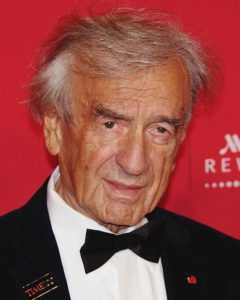 Nobel laureate Elie Wiesel, the Romanian-born Holocaust survivor whose classic “Night” became a landmark testament to the Nazis’ crimes and launched Wiesel’s long career as one of the world’s foremost witnesses and humanitarians, has died at age 87.
Nobel laureate Elie Wiesel, the Romanian-born Holocaust survivor whose classic “Night” became a landmark testament to the Nazis’ crimes and launched Wiesel’s long career as one of the world’s foremost witnesses and humanitarians, has died at age 87.
His death was announced Saturday by Israel’s Yad Vashem Holocaust Memorial. No other details were immediately available. The short, sad-eyed Wiesel, his face an ongoing reminder of one man’s endurance of a shattering past, summed up his mission in 1986 when accepting the Nobel Peace Prize: “Whenever and wherever human beings endure suffering and humiliation, take sides. Neutrality helps the oppressor, never the victim. Silence encourages the tormentor, never the tormented.”
President Barack Obama said of Wiesel on Saturday, “As a writer, a speaker, an activist, and a thinker, he was one of those people who changed the world more as a citizen of the world than those who hold office or traditional positions of power. His life, and the power of his example, urges us to be better.”
For more than a half-century, Wiesel voiced his passionate beliefs to world leaders, celebrities and general audiences in the name of victims of violence and oppression. He wrote more than 40 books, but his most influential by far was “Night,” a classic ranked with Anne Frank’s diary as standard reading about the Holocaust.
“Night” was his first book, and its journey to publication crossed both time and language. It began in the mid-1950s as an 800-page story in Yiddish, was trimmed to under 300 pages for an edition released in Argentina, cut again to under 200 pages for the French market and finally published in the United States, in 1960, at just over 100 pages.
“‘Night’ is the most devastating account of the Holocaust that I have ever read,” wrote Ruth Franklin, a literary critic and author of “A Thousand Darknesses,” a study of Holocaust literature that was published in 2010. “There are no epiphanies in ‘Night. There is no extraneous detail, no analysis, no speculation. There is only a story: Eliezer’s account of what happened, spoken in his voice.” Wiesel began working on “Night” just a decade after the end of World War II, when memories were too raw for many survivors to even try telling their stories. Frank’s diary had been an accidental success, a book discovered after her death, and its entries end before Frank and her family was captured and deported. Wiesel’s book was among the first popular accounts written by a witness to the very worst, and it documented what Frank could hardly have imagined. Read more on YWN.


the jewish world has lost a great man that spoke for all the lost souls of the holocaust..respected and redeemed,there is an empty place in this world now that he is gone.thank you lakewood scoop for your beautiful testimony.1